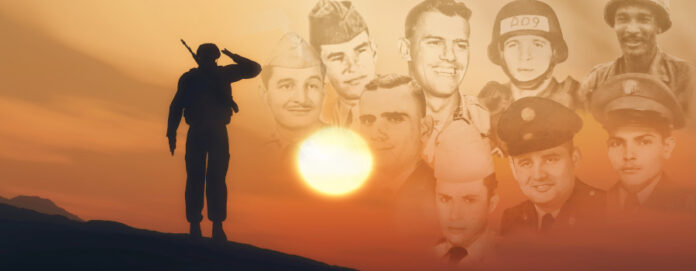Memorial Day is an American holiday to remember the men and women who lost their lives in military conflicts defending this country.
From the American Revolution to the present day, Hispanics have served, risking their lives, to defend the United States and the principles on which the nation is founded.
From the Spaniard Bernardo de Gálvez (Battle of Pensacola, FL) to the Venezuelan Francisco de Miranda (Capture of Yorktown, VA), whose respective contributions were vital to the birth of the United States, to the group of Tejanos Antiesclavistas de Texas from the Civil War (1861-1865), there have always been Hispanics defending the country.
There were also Hispanics among the Confederate and Union soldiers (with special mention of the «Blue and Gray Cowboys» and the Hispanic officer David Farragut, who commanded the Union forces in the capture of New Orleans).
At least 200,000 Hispanics fought in World War I (1914-1918). The exploits of Mexican-American Nicolás Lucero, Marcelino Serna (who never received the Medal of Honor for being a Mexican immigrant), and Texan David Barkeley Cantú have been documented.
Twelve Hispanics earned the Medal of Honor in World War II, in which more than double the number of soldiers who served (around 500,000) were Hispanic (most in the 159th Latino Combat Regiment and Company E of the 141st Infantry Regiment, composed only of Hispanic soldiers).
The Puerto Rican National Guard’s 296th Infantry Regiment saw the participation of 43,434 Puerto Ricans in the Korean War (1950-1953). Tragically, 582 brave men from this regiment lost their lives in combat.
The 65th Infantry Regiment was «the most dedicated… to the support of the democratic principles on which the United States stands…», in the words of its commander William W. Harris. A tree and a plaque in Arlington Cemetery commemorate the valiant «Borinqueneers» (as the 65th Regiment composed exclusively of soldiers from Puerto Rico was known). It was commanded during the Korean War by Richard Cavazos. Founded in 1899, it was not until 2014 that President Barack Obama awarded it the Congressional Gold Medal.
Some 80,000 Hispanics served in the Vietnam War (1963-1973), representing 4.5% of the total number of American forces and around 19% of those killed in the conflict.
Two decades of conflict in Afghanistan claimed the lives of 8% of Hispanic soldiers fighting alongside their American comrades. In Iraq, where the war also took a heavy toll, the first fallen soldier was José Gutiérrez, a 22-year-old undocumented immigrant from Guatemala. Notably, the first U.S. Army nurse killed in combat, María Inés Ortiz, was also of Hispanic descent.
Today, according to the 2020 Census, Hispanics represent 18.7% of the United States population, and according to the Department of Defense, 17% of the country’s military personnel are Hispanic
Five of the 12 servicemen awarded the Navy Cross in Iraq were Hispanic.
Twenty thousand Hispanics participated in Operation Desert Storm (1990-1991).
According to Department of Defense records, sixty Medals of Honor, the highest military distinction, have been awarded to Hispanics. The first Hispanic to receive this decoration was Joseph H. de Castro, who served in the Civil War in the Massachusetts Infantry Regiment.
Félix Longoria (Texas), Maximiliano Luna (New Mexico), Louis Gonzaga Méndez Jr. (of Mexican, Spanish, and Navajo descent), Bernardo Carlos Negrete (Cuba), Elwood R. «Pete» Quesada (of Spanish descent), Héctor Santa Anna (nephew of the Mexican general Antonio López de Santa Anna), Humbert Roque Versace (of Puerto Rican descent), are just a few of the Hispanic military personnel whose remains rest in Arlington National Cemetery.
Not to be forgotten are the women, from the Cuban women of Havana who collected money and sold their jewelry to support the independence cause to the «Nuyorican» Carmen Contreras-Bozak, the first Hispanic woman enlisted in the Women’s Army Corps, to the thousands of Hispanic women who served as nurses and in the WAVES («Women Accepted for Voluntary Emergency Service») during World War II, such as Puerto Rican Carmen Lozano Dumier. Pioneering achievements in leadership include Colonel Maritza Sáenz Ryan, the first Hispanic woman to graduate from West Point, and Puerto Rican General Irene M. Zoppi Rodríguez.
As divisive voices rise against immigrants, it’s crucial to remember the immigrant origins of the United States. The Hispanic community exemplifies this heritage. These brave men and women have served, and are serving, and some have made the ultimate sacrifice to preserve freedom in their adopted home.
To those who fell defending this land, and to all who continue to serve, we offer our deepest gratitude.







